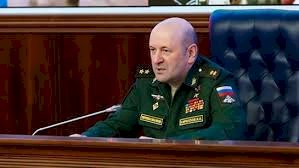Chief of Russia’s nuclear protection forces killed in Moscow bomb blast
Lieutenant General Kirillov killed outside an apartment building in the Russian capital.

A senior Russian general in charge of nuclear protection forces in Moscow has been killed by a bomb hidden in an electric scooter, Russia’s investigative committee said.
Lieutenant General Igor Kirillov, who was chief of the Troops of Radiological, Chemical and Biological Defence, was killed on Tuesday outside an apartment building on Ryazansky Prospekt.
“Igor Kirillov, the head of the radiation, chemical and biological protection forces of the armed forces of the Russian Federation, and his assistant were killed,” the investigative committee said.
Russia’s TASS news agency reported, quoting a law enforcement official, that the explosive device “had a capacity of some 300 grams in TNT equivalent”.
ive device “had a capacity of some 300 grams in TNT equivalent”.

A source within the Ukrainian Security Service (SBU) told Al Jazeera it was behind the attack. “We claim our responsibility for the bombing of the head of the Russian Radiological, Chemical and Biological Defense Forces, Igor Kirillov,” the source said.
Reuters and AFP news agency also cited a source within the SBU that the agency was behind the general’s killing and called him a “legitimate target”. Ukraine has yet to officially comment on the incident.
Photographs posted on Russian Telegram channels showed a shattered entrance to a building littered with rubble and two bodies lying in the blood-stained snow. A criminal case has been opened.
Russia’s radioactive, chemical and biological defence troops are special forces who operate under conditions of radioactive, chemical and biological contamination.
Al Jazeera’s Maria Shapovalova, reporting from Moscow, said according to residents, there was a lack of surveillance cameras in the area where the attack took place.
“Residents of the residential complex where the explosive device went off… have been complaining for years about the lack of normal video surveillance. The cameras were not recording what was happening… on those block of flats,” she said.

Russia has accused Ukraine of carrying out a number of assassinations on its soil since its full-scale invasion of Ukraine began in February 2022, including the August 2022 killing of Darya Dugina, the daughter of Russian ultranationalist Alexander Dugin, in a car bombing.
Dmitry Medvedev, deputy head of Russia’s Security Council chaired by President Vladimir Putin, described the attack as an attempt by Kyiv to distract public attention away from its military failures and vowed that its “senior military-political leadership will face inevitable retribution.”
Foreign Ministry spokesperson Maria Zakharova decried what she said was the West’s failure to condemn the killing.
“An entire day has passed. Where is at least some sort of reaction from abroad? Where are the ‘civilised’ ones? The ‘objective’ ones?” she wrote on the Telegram messaging app.
The assassination, she said, was “the continuation and further development of the West’s spiral of approval of the war crimes of the Kyiv regime’s fighters”.
There was no immediate comment from Putin.
The United States said it was not involved in the killing of the senior army officer, but denounced his “atrocities.”
“I can tell you that the United States was not aware of it in advance and was not involved,” State Department spokesman Matthew Miller said.
“He was a general who was involved in a number of atrocities. He was involved in the use of chemical weapons against (the) Ukrainian military,” Miller said.
On Monday, Ukrainian prosecutors charged Kirillov in absentia with the alleged use of banned chemical weapons in Ukraine, the Security Service of Ukraine said, according to the Kyiv Independent.
Russia denies those accusations.
In October, the United Kingdom sanctioned Kirillov and the nuclear protection forces for using riot control agents and multiple reports of the use of the toxic agent chloropicrin on the battlefield.
Chloropicrin is an oily liquid with a pungent odour known as a choking agent that was widely used during World War I as a form of tear gas. The Organisation for the Prohibition of Chemical Weapons (OPCW) specifically prohibits its use.
Russia has said it no longer possesses a military chemical arsenal but the country faces pressure for more transparency over the alleged use of toxic weapons.
The SBU said it had recorded more than 4,800 uses of chemical weapons on the battlefield, particularly K-1 combat grenades, since February 2022.



















